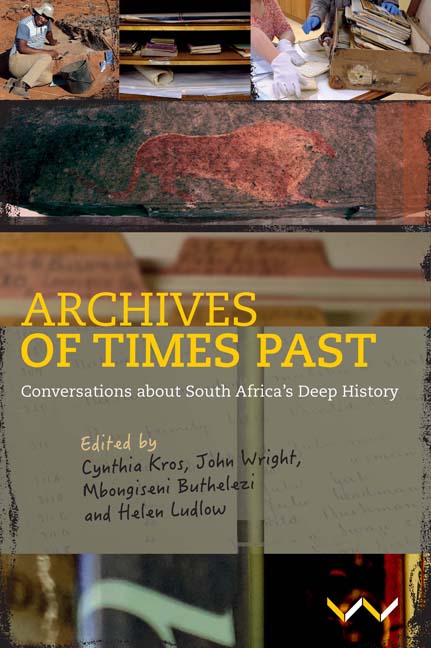Book contents
- Frontmatter
- Contents
- List Of Illustrations
- Acknowledgements
- Editorial Note
- Map
- PART I FIRST THOUGHTS ABOUT THE ARCHIVE
- PART II COMMENTARIES AND CONVERSATIONS
- PART III BECOMING EXPLORERS
- PART IV ENGAGING WITH ARCHAEOLOGY AND ROCK ART
- PART V CONFLICTING OPINIONS
- PART VI FURTHER THOUGHTS
- Glossary
- Contributors
- Index
Chapter 4 - ‘Ask the Old People’; ‘Ask the Professors’
Published online by Cambridge University Press: 26 May 2022
- Frontmatter
- Contents
- List Of Illustrations
- Acknowledgements
- Editorial Note
- Map
- PART I FIRST THOUGHTS ABOUT THE ARCHIVE
- PART II COMMENTARIES AND CONVERSATIONS
- PART III BECOMING EXPLORERS
- PART IV ENGAGING WITH ARCHAEOLOGY AND ROCK ART
- PART V CONFLICTING OPINIONS
- PART VI FURTHER THOUGHTS
- Glossary
- Contributors
- Index
Summary
‘LET'S ASK THE OLD PEOPLE’
Recently many students and scholars in South Africa have demanded that universities should teach more history courses on the times before colonialism. People often assume that writing the history of these times simply means collecting oral accounts of the past from older people and putting them into written form. Individuals might say something like, ‘My grandmother/grandfather tells us wonderful stories about the long-ago past that have been handed down for generations. Why don't we record the best stories we can find from older people and then write them up as history?’
Stories about the past told by knowledgeable people can often teach us ways of looking at history that we will not find in written sources. We can learn about the lives of ordinary people, and not just the doings of kings and political leaders and great warriors. We can learn something about the lives of people who were treated as outsiders in their societies, and not just about the heroes. We can learn about the lives of women, and not just of men. Possibly we can learn something about the lives of non-binary people − that is, people who choose not to be defined according to the gender identities which they were given at birth. We can learn about family histories. And we can get a sense of the importance of stories about the past in helping to give people an idea of their own place in the world.
Think back to Nomalanga Mkhize's story told in chapter 2. Remember that she tells how, when she was a schoolgirl, her main sources of family history were the stories told by her father. Why was this family history important to her? She was excited to find out that one of her ancestors was a close associate of the Zulu king Shaka. This gave her a sense that she and her family belonged in history, and that history belonged to them. This discovery was something that she did not get from school history.
Very often you will not find this kind of history in books. That is why it is important to ‘ask the old people’. But, as is the case for all historical sources, we have to think carefully about what older people have to say about the past.
- Type
- Chapter
- Information
- Archives of Times PastConversations about South Africa's Deep History, pp. 48 - 60Publisher: Wits University PressPrint publication year: 2022

